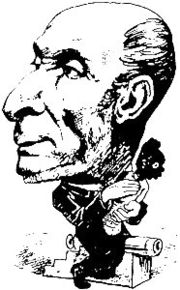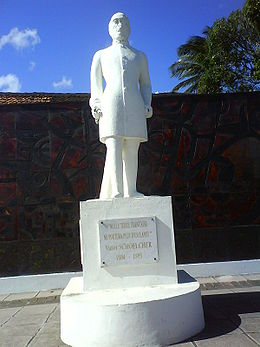
Victor Schoelcher
Encyclopedia

France
The French Republic , The French Republic , The French Republic , (commonly known as France , is a unitary semi-presidential republic in Western Europe with several overseas territories and islands located on other continents and in the Indian, Pacific, and Atlantic oceans. Metropolitan France...
abolitionist writer in the 19th century and the main spokesman for a group from Paris
Paris
Paris is the capital and largest city in France, situated on the river Seine, in northern France, at the heart of the Île-de-France region...
who worked for the abolition of slavery, and formed an abolition society in 1834. He worked especially hard for the abolition of slavery on the Caribbean
Caribbean
The Caribbean is a crescent-shaped group of islands more than 2,000 miles long separating the Gulf of Mexico and the Caribbean Sea, to the west and south, from the Atlantic Ocean, to the east and north...
islands.
Biography
Schoelcher was born in ParisParis
Paris is the capital and largest city in France, situated on the river Seine, in northern France, at the heart of the Île-de-France region...
into the family of an Alsatian
Alsace
Alsace is the fifth-smallest of the 27 regions of France in land area , and the smallest in metropolitan France. It is also the seventh-most densely populated region in France and third most densely populated region in metropolitan France, with ca. 220 inhabitants per km²...
merchant of Fessenheim
Fessenheim
Fessenheim is a commune in the Haut-Rhin department in Alsace in north-eastern France.It is known for:* its hydroelectric power plant on the Grand Canal d'Alsace ;...
. He studied at the College Louis le Grand, became a journalist
Journalist
A journalist collects and distributes news and other information. A journalist's work is referred to as journalism.A reporter is a type of journalist who researchs, writes, and reports on information to be presented in mass media, including print media , electronic media , and digital media A...
, opposing the government of Louis Philippe
Louis Philippe
Louis Philippe may refer to:*Louis-Philippe I, King of the French, last King of France*Prince Philippe, Count of Paris, called King Louis Philippe II by some factions*Louis Philippe I, Duke of Orléans*Louis Philippe II, Duke of Orléans...
and making a reputation as a pamphleteer. After 1826 he devoted himself almost exclusively to advocacy of the abolition of slavery throughout the world, contributing a part of his large fortune to establish and promote societies for the benefit of blacks.
He was sent to visit America for business from 1829-1830. While in America he visited Mexico
Mexico
The United Mexican States , commonly known as Mexico , is a federal constitutional republic in North America. It is bordered on the north by the United States; on the south and west by the Pacific Ocean; on the southeast by Guatemala, Belize, and the Caribbean Sea; and on the east by the Gulf of...
, Cuba
Cuba
The Republic of Cuba is an island nation in the Caribbean. The nation of Cuba consists of the main island of Cuba, the Isla de la Juventud, and several archipelagos. Havana is the largest city in Cuba and the country's capital. Santiago de Cuba is the second largest city...
and some of the southern states of the U.S. While on this trip Schoelcher learned a lot about slavery and began his career as an abolitionist writer. From 1840-1842 he visited the West Indies, and from 1845-1847 Greece, Egypt, Turkey, and the west coast of Africa to study slavery.
He was responsible for the publication of many articles regarding slavery between 1833 and 1847 in which he focused on positive aspects of abolishing slavery. Schoelcher was also intent on social, economic, and political changes being made in the Caribbean colonies. He thought that the production of sugar should continue in the colonies but large central factories should be constructed rather than using slave labor. Schoelcher was the first European abolitionist to visit Haiti
Haiti
Haiti , officially the Republic of Haiti , is a Caribbean country. It occupies the western, smaller portion of the island of Hispaniola, in the Greater Antillean archipelago, which it shares with the Dominican Republic. Ayiti was the indigenous Taíno or Amerindian name for the island...
and had a large influence on the abolitionist movements in all of the French West Indies
French West Indies
The term French West Indies or French Antilles refers to the seven territories currently under French sovereignty in the Antilles islands of the Caribbean: the two overseas departments of Guadeloupe and Martinique, the two overseas collectivities of Saint Martin and Saint Barthélemy, plus...
.

He was elected to the legislative assembly in 1848 and 1849 for Martinique, and introduced a bill for the abolition of the death penalty, which was to be discussed on the day on which Louis-Napoléon Bonaparte made his coup d'état
Coup d'état
A coup d'état state, literally: strike/blow of state)—also known as a coup, putsch, and overthrow—is the sudden, extrajudicial deposition of a government, usually by a small group of the existing state establishment—typically the military—to replace the deposed government with another body; either...
. Disagreeing with this action, on 2 December 1851 he went into exile in Belgium and London.
Refusing to take advantage of the amnesties of 1856 and 1869, he returned to France only after the declaration of war with Prussia
Franco-Prussian War
The Franco-Prussian War or Franco-German War, often referred to in France as the 1870 War was a conflict between the Second French Empire and the Kingdom of Prussia. Prussia was aided by the North German Confederation, of which it was a member, and the South German states of Baden, Württemberg and...
in 1870. Organizing a legion of artillery, he took part in the defence of Paris. In 1871 he was elected again to the national assembly for Martinique. Schoelcher was the most well informed French public figure on the Caribbean colonies and after 1871 developed a group of correspondents between the Caribbean, Great Britain and the United States. He was elected senator for life
Senator for life
A senator for life is a member of the senate or equivalent upper chamber of a legislature who has life tenure. , 7 Italian Senators out of 322, 4 out of the 47 Burundian Senators and all members of the British House of Lords have lifetime tenure...
in 1875.
Schoelcher published his last writings in 1889. After fighting for and writing for the abolition of slavery and French colonialism in the Caribbean for a large portion of the 19th century, Schoelcher died in 1893. First buried in the Père Lachaise Cemetery
Père Lachaise Cemetery
Père Lachaise Cemetery is the largest cemetery in the city of Paris, France , though there are larger cemeteries in the city's suburbs.Père Lachaise is in the 20th arrondissement, and is reputed to be the world's most-visited cemetery, attracting hundreds of thousands of visitors annually to the...
, Schoelcher's remains were transferred on 20 May 1949 to the Panthéon
Pantheon
-Mythology:* Pantheon , the set of gods belonging to a particular mythology* Pantheon * Pantheon, Rome, now a Catholic church, once a temple to the gods of ancient Rome* Any temple dedicated to an entire pantheon-Other buildings:...
. Félix Éboué
Félix Éboué
Félix Adolphe Éboué was a Black French colonial administrator and Free French leader. He was the first black French man appointed to high post in the French colonies, when appointed as Governor of Guadeloupe in 1936...
's ashes were also transferred at the same time.
Works
- De l'esclavage des noirs et de la législation coloniale (On slavery of blacks and colonial legislation) (Paris, 1833)
- Abolition de l'esclavage (Abolition of slavery) (1840)
- Les colonies françaises de l'Amérique (French colonies of America) (1842)
- Les colonies étrangères dans l'Amérique et Hayti (Foreign colonies in America and Haiti) (2 vols., 1843)
- Histoire de l'esclavage pendant les deux dernières années (History of slavery during the last two years) (2 vols., 1847)
- La verité aux ouvriers et cultivateurs de la Martinique (The truth to the workers and farmers of Martinique) (1850)
- Protestation des citoyens français negres et mulatres contre des accusations calomnieuses (Protests of black and mulatto French citizens against slanderous accusations) (1851)
- Le procès de la colonie de Marie-Galante (The process of the Marie-Galante colony) (1851)
- La grande conspiration du pillage et du meurtre à la Martinique (The big conspiracy of theft and murder in the Martinique) (1875)
Legacy
In homage to his fight against slavery, the commune of Case-Navire (MartiniqueMartinique
Martinique is an island in the eastern Caribbean Sea, with a land area of . Like Guadeloupe, it is an overseas region of France, consisting of a single overseas department. To the northwest lies Dominica, to the south St Lucia, and to the southeast Barbados...
) took the name of Schœlcher
Schœlcher
Schœlcher is ta town and the fourth-largest commune in the French overseas department of Martinique.It is located on the west side of the island of Martinique, and is part of the metropolitan area of Fort-de-France, the largest metropolitan area in Martinique.-External links:* *...
on 1888.
The commune of Fessenheim
Fessenheim
Fessenheim is a commune in the Haut-Rhin department in Alsace in north-eastern France.It is known for:* its hydroelectric power plant on the Grand Canal d'Alsace ;...
made from his family's house the Victor Schoelcher museum.

